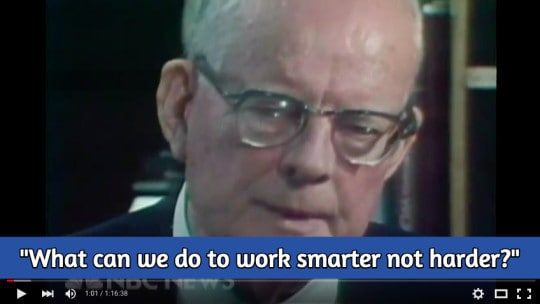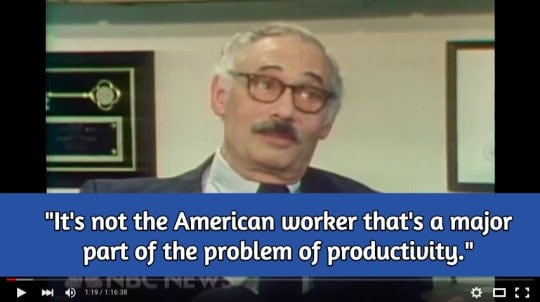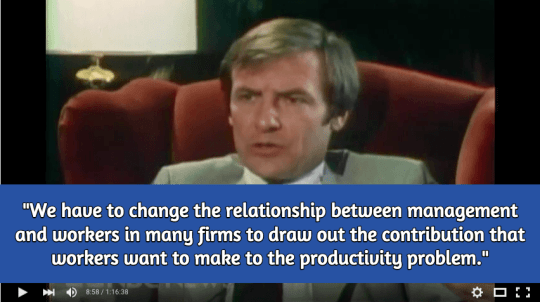 Recently, I shared the famed 1980 NBC documentary, “If Japan Can, Why Can't We?” that essentially introduced W. Edwards Deming to a mainstream Western business audience.
Recently, I shared the famed 1980 NBC documentary, “If Japan Can, Why Can't We?” that essentially introduced W. Edwards Deming to a mainstream Western business audience.
Today, I'm going to share some highlights and thoughts from Part 1 the program (which runs 76 minutes in its entirety).
Clicking of the video screenshots below should take you to the specific part of the video on YouTube's website.
After the program starts with about a minute of random video of robots, steel making, etc., Dr. Deming is the first voice in the video, asking:
That's a very important question when we're talking about how to improve productivity in a company, hospital, or society. It's a cliché now in Dilbert-land to say “work smarter not harder,” but that's a key Lean mindset. We need to use our brains (everybody's brains) to figure out how to do the work in a better way (or eliminate things we shouldn't be doing at all).
Then, Herbert Striner, dean of the American University school of business says:
Dean Striner just passed away in August, at age 92.
When I worked at GM in the mid 1990s, it was still popular to blame the worker… both in my plant and in society.
Even today, some healthcare executives seem to think that Lean is a method for fixing the workers. Dr. Deming, in his work, realized that workers weren't the problem… our results are mostly due to the system and senior executives have the most responsibility for said system. That's why Deming was hard on executives.
I'd say, similarly about healthcare:
“It's not the American healthcare worker that's a major part of the problem of productivity (or safety or quality).”
If you're still blaming your employees for what what ails your organization (like this hospital CEO), you're not going to get very far with Lean.
The beginning of the program sets the context of the economic stagnation of the United States. Japan is beating the U.S. in the world economy. How are they doing so as a country 1/25th the size of the U.S.? Japan's productivity has been increasing about 10% a year in 1978 and 1979 and America's productivity is flat or falling slightly.
Quality is discussed in the program, but productivity and competitiveness was the real concern. Add in the context of inflation and recession, it was a difficult time. There was a concern, stated at the end of the show, that this next generation will be the first to live worse than their parents. A familiar fear, eh?
The program focuses a lot on the role of government regulation as a barrier to productivity. But, there's a contrast drawn (and a generalization) that Americans whine about regulation and contact their Congressman while the Japanese put their engineers on the problem, for example, creating car engines that meet American mileage and emissions standards.
There's also a big focus on technology, such as a gee-whiz look at new-fangled supermarket bar code check out scanners.
But, what I love about the documentary is the focus on people and leadership.
About 9:00 in, Jerry Jasinowski (then with the Commerce Department) said:
The “Kaizen” philosophy, as a key part of Lean, is all about drawing out ideas and input from everybody in the organization, and helping them implement ideas.
The program starts to discuss the lack of trust between management and employees. I think it's on management to start breaking that stalemate, doing what they can to build trust and better relationships, creating a culture that allows people to feel safe in speaking up. Later parts of the NBC program talk about people not losing their jobs through productivity improvement, another key Lean and Toyota principle.
Notes on Parts 2 through 4 to come, but again, you can watch the whole video online.
I'd love to hear your reactions and thoughts about this from a contemporary perspective.
Please scroll down (or click) to post a comment. Connect with me on LinkedIn.
Let’s build a culture of continuous improvement and psychological safety—together. If you're a leader aiming for lasting change (not just more projects), I help organizations:
- Engage people at all levels in sustainable improvement
- Shift from fear of mistakes to learning from them
- Apply Lean thinking in practical, people-centered ways
Interested in coaching or a keynote talk? Let’s talk.
Join me for a Lean Healthcare Accelerator Trip to Japan! Learn More












